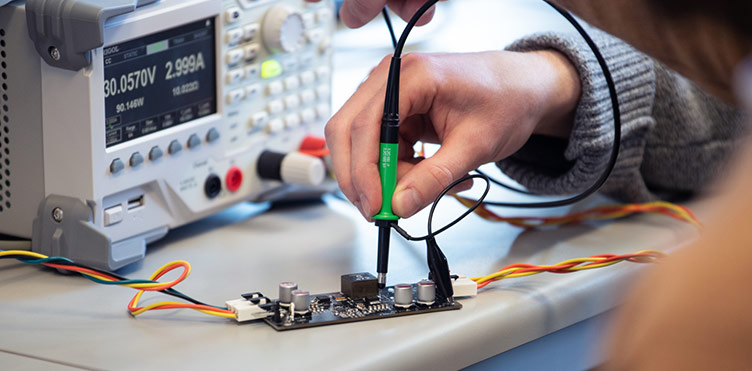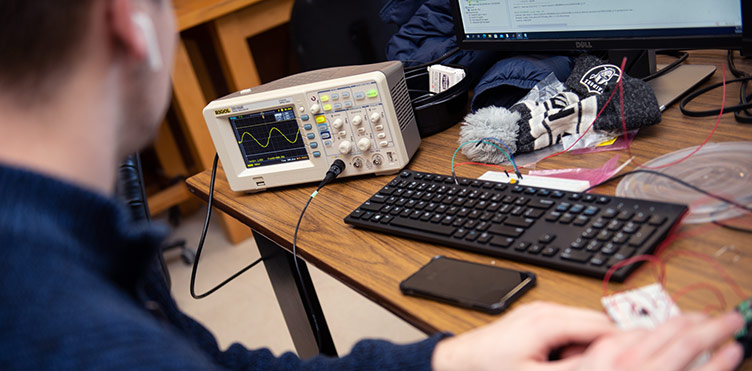Undergraduate programs

We put the zing in everything
We power up modern life and can make it fun. We can fly you to the moon and provide safe, secure communications to call home. Need an app for gaming that entertains? ECE graduates have you covered. From the serious needs in healthcare to information for disasters, and ways to communicate with friends, ECE graduates can do it all.
With a degree from ECE you could:
- improve people's lives through biomedical innovation and wearable technologies
- develop controls and instrumentation for robotics
- power up with renewable energy systems
- enhance communications with wireless and networking
- make digital data sing through signal processing in smartwatches, cell phones, hearing aids, and self-driving cars
- create the circuit boards that direct spacecraft
Electrify your future with captivating possibilities that go far beyond your imagination.

Degree options
Discover three departmental degrees.
Electrical Engineering
Be ready to design, develop, test, and maintain the electrical equipment used in everything from electric motors to radar and navigation systems. Focus on communications systems or lead on power generation. You could choose to design the electrical systems for vehicles, aircraft, or even spacecraft.
With options from biomedical to communications, electrical engineering prepares you for diverse careers.
Within electrical engineering you could choose to focus on these two program options:
Software Engineering
A collaborative program between Electrical Engineering and the Faculty of Computer Science allows you to design software for multiple uses and types of technology.
Want to develop the next app? Apply engineering techniques to design, implement, test, and maintain software products? When you finish this program you are eligible to register as an Information Systems Professional as well as becoming a licensed professional engineer.
Learn more about Software engineering
Engineering Physics
Do you want to work at the forefront of technological development? Would you be excited to contribute to future space missions?
Engineering Physics is a joint program between UNB Engineering (ECE) and the Faculty of Science (physics department). Unique in Canada, this program has been developed based on national and regional industry demands and the expertise available at UNB. While here you will receive a solid foundation of theoretical and applied science skills. This experience prepares you for almost any career in the technology sector or to pursue post-graduate degrees in engineering or physics.
Why do Engineering Physics at UNB? You can test your skills on research projects, develop work skills with co-op, and focus on one of two specializations while learning from experts in their fields.
Two specializations are available:
- Space systems engineering: satellite and payload design, spacecraft guidance, navigation, and control
- Optical engineering: fiber-optic communication systems, laser physics, lens system design, and photonic devices
Exciting career paths await you after graduation:
- space systems engineer or scientist
- aerospace & defense engineer or scientist
- optical systems engineer or scientist
- communications engineer
- electro-optic/photonic engineer or scientist
- science & energy policy writer
- patent agent or analyst
We have a diploma option and work opportunities to enhance your skills.
- Diploma in Technology Management and Entrepreneurship (TME)
- Co-op designation on your degree with co-op work terms in the Co-op Program

Look ahead to an exhilarating future after graduating UNB Engineering. You could:
- create new software to guard against cyberattacks
- craft an app that teaches about biodiversity in the landscape
- develop and design systems for advanced manufacturing
- implement communication systems
- improve systems that produce, transmit, and use electric power
- design electric cars
- employ process control to ensure the safe operation of manufacturing processes
- develop and implement sustainable energy solutions
- design and build optical systems
- participate in the space race by designing and building spacecraft, missiles, and satellites
From microchips to potato chips, you can work in a wide variety of industries including electronics, automotive, IT, gaming, telecoms, manufacturing, power generation, power distribution, energy storage, transport, utilities and construction.
All of modern life requires electrical engineering knowledge. You choose your path and career. The only limit is your imagination.

